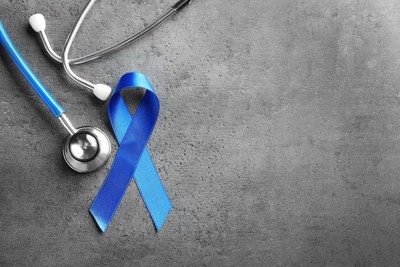The Barbara Ann Karmanos Cancer Institute, along with cancer centers and other organizations across the nation, recognizes March as Colorectal Cancer Awareness Month.
DETROIT, March 1, 2021 /PRNewswire/ -- The Barbara Ann Karmanos Cancer Institute, along with cancer centers and other organizations across the nation, recognizes March as Colorectal Cancer Awareness Month. Colorectal cancer is the third most common cancer in both men and women; however, there are a variety of screening tests available to detect colorectal cancer.
Colorectal Cancer Facts and Figures
According to the American Cancer Society (ACS):
- Each year, more than 140,000 people in the United States are diagnosed with colorectal cancer.
- More than 50,000 people in the United States will die from colorectal cancer this year.
- The lifetime risk of developing colorectal cancer is about 1 in 23 for men and 1 in 25 for women.
- The death rate from colorectal cancer has been dropping in both men and women.
- There are more than 1.5 million survivors of colorectal cancer in the United States.
All data reported by the American Cancer Society.
Colorectal Cancer Symptoms and Risk Factors
Early colorectal cancer has no symptoms, so regular screening is vital to early detection. As the cancer progresses, symptoms that may occur can include a change in bowel habits such as diarrhea, constipation or blood in the stool, cramping or pain in the lower abdominal (stomach) area and constant tiredness or lack of energy.
Any man or woman can get colorectal cancer, although certain factors increase your risk. People at increased risk include men and women who:
- Are age 45 and older.
- Have a family history of colorectal cancer or other genetic factors, such as Lynch Syndrome.
- Have a personal history of colorectal cancer or polyps.
- Have Inflammatory Bowel Disease (IBD), also known as Crohn's disease or Ulcerative Colitis.
- Are obese and/or are physically inactive.
- Have a diet that is high fat or high in red or processed meat and low in fiber, calcium, fruit and vegetables.
Colorectal Cancer Screening
Colonoscopy
During a colonoscopy, a small flexible tube with a camera at the tip is inserted into the anus. It passes through the rectum and colon to detect abnormalities such as polyps. During this procedure, your physician may biopsy or remove suspicious-looking areas. Patients are sedated for this procedure.
Cologuard
Cologuard is a stool test that screens for abnormalities in the DNA, which can be caused by cancer or polyp cells. This test is performed at home and requires a stool collection. After an appointment with your Karmanos provider, our team will help you arrange for your test to be sent directly to your home. Your Cologuard test will arrive in the mail and contain all the elements needed for at-home testing, including detailed instructions.
Screening Guidelines
Men and women at average risk should schedule their first colonoscopy at age 45 and continue every five to 10 years if the results are normal. Cologuard testing should also begin at age 45. With normal results, this test should be repeated every three years.
Those with increased risk should discuss their screening needs with their health care provider and may need to begin screening early and complete it more frequently.
To learn more about colorectal cancer screening at Karmanos, visit https://www.karmanos.org/karmanos/colon-cancer-screening
Colorectal Cancer Treatment at Karmanos Cancer Institute
At Karmanos, colorectal cancer is treated by the Gastrointestinal & Neuroendocrine Tumors Multidisciplinary Team, which includes surgical oncologists, medical oncologists, radiologists, pathologists, pharmacists, dietitians, social workers and genetic counselors. The team is entirely focused on treating gastrointestinal cancers and shares its collective expertise to create a customized treatment plan for each patient.
Our team of gastrointestinal oncologists is among the best in the world. The team collectively designs and conducts clinical trials and translational research. They contribute to publications on the surgical and medical management of gastrointestinal malignancies. For example, gastrointestinal cancers commonly spread to the liver that often requires a detailed assessment by the members of the multidisciplinary team using sophisticated imaging techniques, followed by a combination of treatment approaches. To learn more about the Colorectal Cancer Screening offered at Karmanos, visit https://www.karmanos.org/karmanos/colon-cancer-screening.
ABOUT THE BARBARA ANN KARMANOS CANCER INSTITUTE
Karmanos Cancer Institute is a leader in transformative cancer care, research and education through courage, commitment and compassion. Our vision is a world free of cancer. As part of McLaren Health Care, Karmanos is the largest provider of cancer care and research in the state of Michigan. For more than 75 years, our administrative and research headquarters, along with our premier specialty cancer hospital, have been located in downtown Detroit. Our 15 network sites throughout the state deliver market-leading cancer care and clinical trials conveniently to the communities where many of our patients live. Karmanos is recognized by the National Cancer Institute as one of the best cancer centers in the nation. Our academic partnership with the Wayne State University School of Medicine provides the framework for cancer research and education – defining new standards of care and improving survivorship. For more information, call 1-800-KARMANOS (800-527-6266) or visit www.karmanos.org. Follow Karmanos on Facebook, Twitter, LinkedIn and YouTube.
![]() View original content to download multimedia:http://www.prnewswire.com/news-releases/karmanos-cancer-institute-recognizes-march-as-colorectal-cancer-awareness-month-301237876.html
View original content to download multimedia:http://www.prnewswire.com/news-releases/karmanos-cancer-institute-recognizes-march-as-colorectal-cancer-awareness-month-301237876.html
SOURCE Karmanos Cancer Institute






